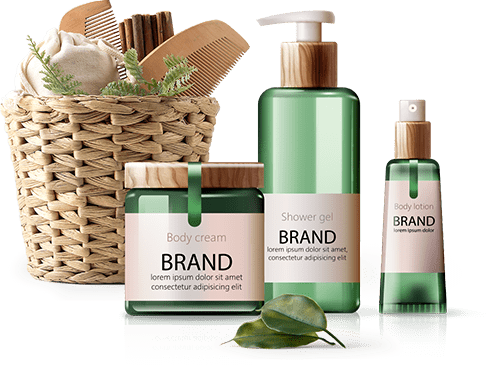Is silicone-free the only option? Understanding silicone and debunking the biggest controversy in beauty products
Image | Photo by canva
With rising ingredient awareness, consumers are increasingly concerned about the source and safety of product ingredients. Silicone has become a controversial ingredient in hair care and cosmetics. Many believe it clogs pores, causes hair loss, and is difficult to rinse out, leading them to actively choose so-called "silicone-free" products. However, these views are largely based on anecdotal information and marketing rhetoric, and are inconsistent with actual scientific data.
What is Dimethicone? What are its properties?
Silicone is a synthetic silicone-oxygen polymer widely used in skincare, haircare, and makeup products. It primarily forms a protective film on the surface of skin or hair, is non-absorbable, and is non-biotoxic.
Silicone has the following key properties:
- Non-toxicity and safety: Multiple safety assessments have confirmed no carcinogenic or toxic risks. Its high molecular weight prevents it from penetrating the skin barrier or entering the bloodstream, remaining confined to the surface.
- High stability: Highly heat-resistant and oxidative-resistant, it resists deterioration, making it suitable for products requiring high-temperature processing or long-lasting protection, such as perms and makeup.
- Smooth and Soft-Focus: Commonly used in products like primers, foundations, and hair oils, it imparts excellent spreadability and a "soft, matte" finish, minimizing the appearance of pores and fine lines, enhancing touch and adherence.
- Waterproof and Humidity-Resistant: Many silicones are water-resistant and sweat-resistant, making them common ingredients in makeup, sunscreen, and diving products, helping to increase the longevity of makeup.
- Biodegradable: Some new silicones are designed to decompose in the natural environment. While environmental concerns remain, the industry is already developing improved versions with low residue and easy biodegradability.
What are the practical uses of silicones? You use them every day!
- Purposes: Repair, protect, smooth, fight frizz, and prevent breakage
- Common Products: Repairing essential oils (such as Moroccan oil), perm protectants, hair lotions, conditioners, leave-in sprays, and color-maintaining products (anti-fade masks)
- How it works: Silicone coats the hair cuticle, creating a smooth, protective layer that shields against heat and chemical damage. For severely damaged hair, using products containing silicone can effectively reduce breakage, frizz, and dryness, creating a smooth, silky effect.
Makeup Products
- Applications: Smooth feel, soft-focus matte finish, waterproof, and fading-resistant
- Common Products: Primer (oil control, pore-filling), liquid foundation, cream, lipstick, lip gloss, concealer, powder, setting spray, long-lasting makeup
- How it works: Increases makeup's spreadability, fills uneven pores, and improves makeup's staying power and waterproofing.
Skincare Products
- Purposes: Locks in moisture, increases spreadability, and moisturizes without feeling greasy.
- Common Products: Moisturizing creams, gels, repair serums, sunscreens (with silicone for water and sweat resistance), and sensitive skin care products (to reduce friction and irritation).
- How it works: Forms a thin protective film to prevent moisture evaporation and improve skin's feel.
Makeup Removers
- Purpose: Quickly emulsifies, removes makeup, leaves skin feeling fresh and non-greasy
- Common Products: Cleansing oils, eye and lip makeup removers, dual-layer oil-water makeup removers
- How it works: Most cleansing oils and eye and lip makeup removers emphasize "clean removal" by quickly dissolving makeup and evaporating it gently, reducing greasiness.
Personal Cleansing/Skin Care Products
- Purpose: Lubricates, reduces friction, and improves the feel of the skin
- Common Products: Antiperspirants, body balms, after-shave/shave gels, skin softening lotions
- How it works: Forms a non-irritating film on the skin, reducing friction and irritation.
Medical and Specialty Uses
- Applications: Lubrication, repair, physical protection
- Common Products: Baby skin cream, medical silicone dressing (scar reduction), wound repair cream, intimate area lubricant
- How it works: Hypoallergenic and low-irritation, suitable for protecting sensitive and damaged skin barriers.
From hair, face, and body to makeup and makeup removal, and even medical and sensitive skin care, silicone has a role to play. When used and cleaned properly, silicone is a safe, effective, and low-risk ingredient. In other words, you may be using silicone-containing products every day without even realizing it.
Is Dimethicone harmful? The key lies in usage and cleansing
Whether Dimethicone is harmful is a concern for many consumers. Common online claims include: "Dimethicone clogs pores," "causes hair loss," and "can't be washed out." However, based on current scientific research and ingredient evaluation, these concerns are mostly generalizations or oversimplifications.
According to the Ministry of Health and Welfare's Drug and Food Safety Weekly Report, Issue 611, silicones do adhere to hair after shampooing with silicone-containing lotions, but the amount of silicone adhered reaches a plateau after about five uses. A single use of a non-conditioning lotion can remove most of the silicone. This means that with proper cleansing, silicone residue can be effectively controlled.
In summary, with the correct shampooing and makeup removal methods, silicone film can be effectively removed without any health risks. Therefore, rather than rejecting silicones completely, it's more important to understand the overall product formula and personal needs. For example, for damaged hair, perming and dyeing repair, and makeup longevity, appropriate use of silicone products can actually deliver better results.
Can babies and young children use products containing dimethicone?
Currently, baby skincare products on the market commonly use dimethicone, a member of the dimethicone family, as a primary ingredient. Dimethicone acts as a skin protectant and is commonly found in lotions, soothing creams, and diaper rash treatments. These products are often designed with the sensitive skin of infants and young children in mind, emphasizing fragrance-free, hypoallergenic, and non-irritating properties.
Dimethicone's main functions in products include:
- Forming a protective film:Isolating external irritants and moisture loss, maintaining the integrity of the skin barrier.
- Improving dry and itchy skin: Combats eczema, dryness, and minor abrasions, often used in soothing and moisturizing formulas.
- Hypoallergenic and low-irritation: Suitable for infants, children, and those with atopic or sensitive skin.
The US FDA has officially designated dimethicone as a skin protectant, legally allowing its use in topical products and confirming its safety and effectiveness.
Dimethicone is not a single solution; it's a "formulation tool."
From the perspective of a contract manufacturer, Dimethicone isn't a bad ingredient; rather, it's a stable and flexible ingredient. Currently, due to oversimplified marketing claims, Dimethicone is misunderstood and even deliberately excluded. However, in our professional contract manufacturing experience, we prioritize not just whether it's added but how the ingredients are combined to achieve optimal efficacy and texture. There are numerous types of dimethicone, each with varying volatility, skin affinity, and lubricity. Through specialized formula design, we can create optimal blends for both effectiveness and skin feel, tailored to individual hair conditions and product needs.
Latest Regulatory Trends: The EU Increases Restrictions on the Use of Certain Dimethicone Types in Cosmetics. What Should We Do?
On May 16, 2024, the EU officially announced that starting June 6, 2027, cosmetics containing D4, D5, and D6 from the dimethicone family at concentrations exceeding 0.1% will no longer be marketed. This restriction is primarily based on environmental protection and sustainable development considerations.
As a professional contract manufacturer with many years of R&D and manufacturing experience, Mei Wang understands that each brand has unique needs when it comes to product positioning and formulation selection. In response to the latest EU regulatory changes, we can provide an alternative solution that is up-to-date, more stable, safer, and more environmentally friendly. This not only meets regulatory requirements but also maintains product texture, feel, and functional effects. Whether you choose to add dimethicone or not, as long as you provide your desired efficacy and needs, MayWan can help design the most suitable and market-competitive professional formula and work with you to create the next best-selling product.
Contact a professional development consultant now
Let's work together to create a unique product that combines efficacy and market appeal.
TEL: (06) 796-1312
LINE ID: @maywan
- 【A Must-Save Guide for Startups】Skincare OEM Factory Collaboration Guide|Prepare These 5 Things for Smoother Product Development!
- 2025 Hong Kong Beauty Expo (Cosmoprof Asia) | Post-Expo Highlights Summary
- Anti-hair Loss Product Formula Analysis: Three Popular Non-medicinal Hair Care Ingredients Recommended
- 3 essential key points for OEM/ODM skincare products! OEM skincare factory products and experience are crucial
- Back to skincare basics: the golden hydration combo that makes ingredients work better together
- Say no to oily skin! Understand the root cause of oiliness and restore moisturized skin
- How Are Skincare OEM Costs Calculated? Understanding MOQ Pricing and Small-Batch Manufacturing
- Beauty and skincare trends, let's take a look at the mainstream ingredient analysis!


